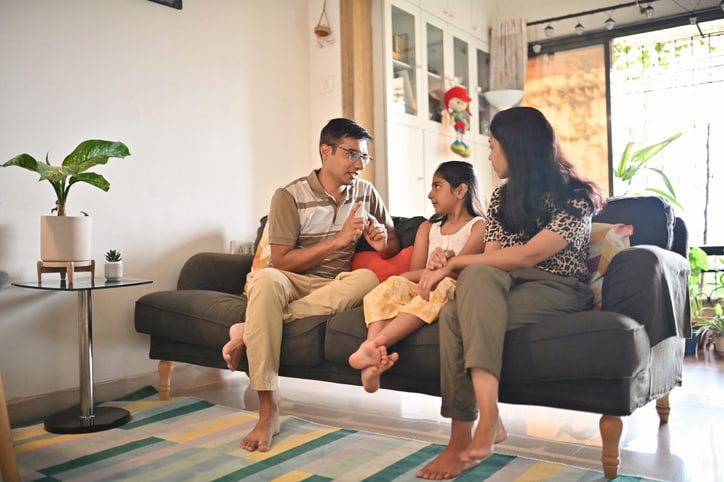At what age is a child considered a toddler? Technically, there is an answer to that question, one on which experts widely agree.
Put simply, the official toddler age range is described as 1 to 3 years old, according to the American Academy of Pediatrics (AAP). But it’s important to remember that all kids are individuals, and the precise age range or technical definition of the developmental stages matters less than when and why we use them.
The official toddler age range is described as 1 to 3 years old, according to the American Academy of Pediatrics. But it’s important to remember that all kids are individuals.
The lines of developmental stages aren’t clear cut, says Bethany Cook, a licensed clinical psychologist in the Chicago area and the author of “For What It’s Worth – A Perspective on How to Thrive and Survive Parenting Ages 0-2.” Rather, she says, “they offer benchmarks for parents and professionals when it comes to identifying potential mental, emotional or physical issues.”
“Parents can become overly focused [on] when their child starts X, Y, Z — and it’s understandable with all the doctors, experts, grandparents, etc. saying your child should be doing X by certain times,” Cook explains. It’s much more important, however, to use these terms as guideposts that can help you and your child as they grow.
In other words, resist the urge to obsess over terminology — but … if you must, keep reading for a deeper dive into the definition of a toddler and find out what the word means, when it matters and when it doesn’t.
What’s the toddler age range?
When asked, “How old is a toddler?” experts agree with the AAP definition: Officially, the toddler age range is between 12 and 36 months.
Dr. Pierrette Mimi Poinsett, Northern California-based pediatrician and medical consultant at Mom Loves Best, explains further, “Toddlerhood is a period of especially rapid growth and development. Toddlers are learning several skills, including walking, talking and potty training. It is also a period when temperament becomes more apparent.”
“Toddlerhood is a period of especially rapid growth and development. Toddlers are learning several skills, including walking, talking and potty training. It is also a period when temperament becomes more apparent.”
— DR. PIERRETTE MIMI POINSETT
What is the starting age for toddlers? (Or do kids only reach toddlerhood once they toddle?)
While experts agree that the starting age for a toddler is 12 months for discussion’s sake, the nomenclature is really not that exact.
“Toddlerhood isn’t something that your child one days wakes up and is,” Cook says. “They will more or less morph into this stage in spurts and starts. One day you just sit back and look at your child and say, ‘When did they go from being my baby to being a toddler?’”
“Toddlerhood isn’t something that your child one days wakes up and is. They will more or less morph into this stage in spurts and starts.”
— BETHANY COOK, CLINICAL PSYCHOLOGIST
Cook also notes that while some kids may begin walking as early as 9 months old, she wouldn’t automatically label them a toddler. Why? “Other areas of development also need to catch up — speech and social-emotional abilities,” she explains, “and until they do, you won’t get that toddler vibe.”
Is a 1.5 year old a toddler?
Technically, yes. “According to the AAP, once your baby celebrates their first birthday, they have officially turned into a toddler,” explains Carole Kramer Arsenault, a registered nurse and the CEO of Boston Baby Nurse & Nanny. “This period lasts until the third birthday.”
The Centers for Disease Control and Prevention (CDC) uses the same metric of 1 to 3 years old. So by this measure too, a child at 1.5 years old is indeed of toddler age.
Is a 3-year old a toddler? What about a 4- or 5-year old?
Technically no, as AAP guidelines put the toddler-age cutoff at 36 months — or the child’s third birthday. That said, Cook adds, “as with all developmental stages, there is not a hard and fast start-stop date.”
Can a toddler also be a preschooler?
“Yes and no,” Arsenault explains. “Some toddlers do attend preschool, but as a general rule, the preschool period starts at your child’s third birthday.”
“Toddler” and “preschooler” may be overlapping terms, but they’re not necessarily connected. “A toddler is not a preschooler, and the term preschooler doesn’t mean your child has to be enrolled in an educational program,” Cook says. “The developmental trajectory and expectations of these two terms are similar but very different.”
For example, in terms of development, a toddler and preschooler could both potentially carry a dish from the table to the kitchen sink, Cook notes. “Toddlers are still developing fine and gross motor skills, which may make this ask more challenging,” she says, “whereas a 3- to 4-year old would be steadier on their feet and have more practice with fine motor tasks — and this request wouldn’t be as difficult.”
There can be emotional differences between the two also, says Arsenault, “Toddlers have not yet learned how to regulate emotions,” she says. “Children at 36 months of age are ready to learn social interactions, unlike the toddler who is just starting to learn about the world.”
Read more: What’s the difference between 24 months and 2T?
Toddler age: Why does it matter anyway?
In some cases, Cook says, parents and experts may find this terminology useful when discussing and assessing a child’s development, for example, if a child is falling behind in an area. “It’s important to understand and appreciate where your child may be on the continuum,” she explains, “as it helps you identify realistic expectations.”
But overall, does the precise definition of toddlerhood matter? Probably not that much. Words like “toddler” serve as a useful shorthand for discussion purposes and can be taken as guideposts. But in the end, every child is an individual, toddling to the beat of their own drummer.






